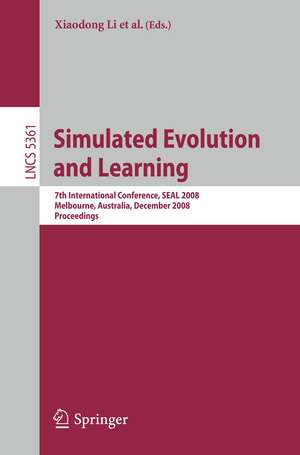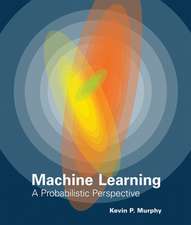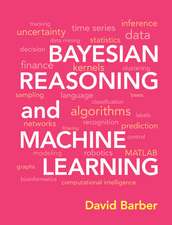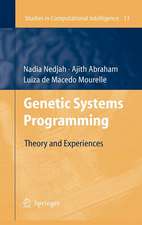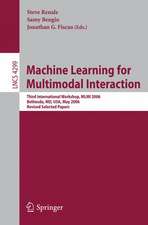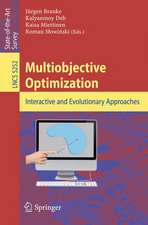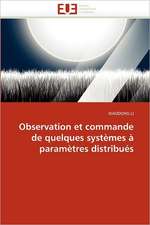Simulated Evolution and Learning: 7th International Conference, SEAL 2008, Melbourne, Australia, December 7-10, 2008, Proceedings: Lecture Notes in Computer Science, cartea 5361
Editat de Xiaodong Li, Michael Kirley, Mengjie Zhang, Vic Ciesielski, Zbigniew Michalewicz, Tim Hendtlass, Kalyanmoy Deb, K. C. Tan, Jürgen Brankeen Limba Engleză Paperback – 19 noi 2008
Din seria Lecture Notes in Computer Science
- 20%
 Preț: 1061.55 lei
Preț: 1061.55 lei - 20%
 Preț: 307.71 lei
Preț: 307.71 lei - 20%
 Preț: 438.69 lei
Preț: 438.69 lei - 20%
 Preț: 645.28 lei
Preț: 645.28 lei -
 Preț: 410.88 lei
Preț: 410.88 lei - 15%
 Preț: 580.46 lei
Preț: 580.46 lei - 17%
 Preț: 427.22 lei
Preț: 427.22 lei - 20%
 Preț: 596.46 lei
Preț: 596.46 lei -
 Preț: 449.57 lei
Preț: 449.57 lei - 20%
 Preț: 353.50 lei
Preț: 353.50 lei - 20%
 Preț: 1414.79 lei
Preț: 1414.79 lei - 20%
 Preț: 309.90 lei
Preț: 309.90 lei - 20%
 Preț: 583.40 lei
Preț: 583.40 lei - 20%
 Preț: 1075.26 lei
Preț: 1075.26 lei - 20%
 Preț: 310.26 lei
Preț: 310.26 lei - 20%
 Preț: 655.02 lei
Preț: 655.02 lei - 20%
 Preț: 580.93 lei
Preț: 580.93 lei - 20%
 Preț: 340.32 lei
Preț: 340.32 lei - 18%
 Preț: 938.83 lei
Preț: 938.83 lei - 20%
 Preț: 591.51 lei
Preț: 591.51 lei - 15%
 Preț: 438.59 lei
Preț: 438.59 lei - 20%
 Preț: 337.00 lei
Preț: 337.00 lei -
 Preț: 389.48 lei
Preț: 389.48 lei - 20%
 Preț: 607.39 lei
Preț: 607.39 lei - 20%
 Preț: 1024.44 lei
Preț: 1024.44 lei - 20%
 Preț: 579.30 lei
Preț: 579.30 lei - 20%
 Preț: 763.23 lei
Preț: 763.23 lei - 20%
 Preț: 453.32 lei
Preț: 453.32 lei - 20%
 Preț: 575.48 lei
Preț: 575.48 lei - 20%
 Preț: 585.88 lei
Preț: 585.88 lei - 20%
 Preț: 825.93 lei
Preț: 825.93 lei - 20%
 Preț: 763.23 lei
Preț: 763.23 lei - 17%
 Preț: 360.19 lei
Preț: 360.19 lei - 20%
 Preț: 1183.14 lei
Preț: 1183.14 lei - 20%
 Preț: 340.32 lei
Preț: 340.32 lei - 20%
 Preț: 504.57 lei
Preț: 504.57 lei - 20%
 Preț: 369.12 lei
Preț: 369.12 lei - 20%
 Preț: 583.40 lei
Preț: 583.40 lei - 20%
 Preț: 343.62 lei
Preț: 343.62 lei - 20%
 Preț: 350.21 lei
Preț: 350.21 lei - 20%
 Preț: 764.89 lei
Preț: 764.89 lei - 20%
 Preț: 583.40 lei
Preț: 583.40 lei - 20%
 Preț: 649.49 lei
Preț: 649.49 lei - 20%
 Preț: 341.95 lei
Preț: 341.95 lei - 20%
 Preț: 238.01 lei
Preț: 238.01 lei - 20%
 Preț: 538.29 lei
Preț: 538.29 lei
Preț: 664.11 lei
Preț vechi: 830.14 lei
-20% Nou
Puncte Express: 996
Preț estimativ în valută:
127.07€ • 132.68$ • 105.17£
127.07€ • 132.68$ • 105.17£
Carte tipărită la comandă
Livrare economică 05-19 aprilie
Preluare comenzi: 021 569.72.76
Specificații
ISBN-13: 9783540896937
ISBN-10: 3540896937
Pagini: 676
Ilustrații: XVI, 658 p.
Dimensiuni: 155 x 235 x 28 mm
Greutate: 0.93 kg
Ediția:2008
Editura: Springer Berlin, Heidelberg
Colecția Springer
Seriile Lecture Notes in Computer Science, Theoretical Computer Science and General Issues
Locul publicării:Berlin, Heidelberg, Germany
ISBN-10: 3540896937
Pagini: 676
Ilustrații: XVI, 658 p.
Dimensiuni: 155 x 235 x 28 mm
Greutate: 0.93 kg
Ediția:2008
Editura: Springer Berlin, Heidelberg
Colecția Springer
Seriile Lecture Notes in Computer Science, Theoretical Computer Science and General Issues
Locul publicării:Berlin, Heidelberg, Germany
Public țintă
ResearchCuprins
Evolutionary Learning.- Modelling Behaviour Cycles for Life-Long Learning in Motivated Agents.- Breaking the Synaptic Dogma: Evolving a Neuro-inspired Developmental Network.- A New Approach to Adapting Control Parameters in Differential Evolution Algorithm.- A Novel Genetic Algorithm with Orthogonal Prediction for Global Numerical Optimization.- Phylogeny Inference Using a Multi-objective Evolutionary Algorithm with Indirect Representation.- Evolved Look-Up Tables for Simulated DNA Controlled Robots.- Multi-objective Improvement of Software Using Co-evolution and Smart Seeding.- Policy Evolution with Grammatical Evolution.- A PSO Based Adaboost Approach to Object Detection.- Adaptive Non-uniform Distribution of Quantum Particles in mQSO.- Genetically Evolved Fuzzy Rule-Based Classifiers and Application to Automotive Classification.- Improving XCS Performance by Distribution.- Evolving an Ensemble of Neural Networks Using Artificial Immune Systems.- Improving the Performance and Scalability of Differential Evolution.- A Fuzzy-GA Decision Support System for Enhancing Postponement Strategies in Supply Chain Management.- Evolutionary Optimisation.- Solving the Delay-Constrained Capacitated Minimum Spanning Tree Problem Using a Dandelion-Encoded Evolutionary Algorithm.- Generalized Extremal Optimization for Solving Multiprocessor Task Scheduling Problem.- Improving NSGA-II Algorithm Based on Minimum Spanning Tree.- An Island Based Hybrid Evolutionary Algorithm for Optimization.- A Particle Swarm Optimization Based Algorithm for Fuzzy Bilevel Decision Making with Objective-Shared Followers.- Reference Point-Based Particle Swarm Optimization Using a Steady-State Approach.- Genetic Algorithm Based Methods for Identification of Health Risk Factors Aimed at Preventing Metabolic Syndrome.- Extremal Optimisation and Bin Packing.- Extremal Optimisation with a Penalty Approach for the Multidimensional Knapsack Problem.- A Generator for Multimodal Test Functions with Multiple Global Optima.- Choosing Leaders for Multi-objective PSO Algorithms Using Differential Evolution.- Comparison between Genetic Algorithm and Genetic Programming Performance for Photomosaic Generation.- Parameter Tuning of Real-Valued Crossover Operators for Statistics Preservation.- Hybrid Particle Swarm Optimization Based on Thermodynamic Mechanism.- Multiagent Evolutionary Algorithm for T-coloring Problem.- Non-photorealistic Rendering Using Genetic Programming.- Use of Local Ranking in Cellular Genetic Algorithms with Two Neighborhood Structures.- Information Theoretic Classification of Problems for Metaheuristics.- Task Decomposition for Optimization Problem Solving.- Discussion of Search Strategy for Multi-objective Genetic Algorithm with Consideration of Accuracy and Broadness of Pareto Optimal Solutions.- Discussion of Offspring Generation Method for Interactive Genetic Algorithms with Consideration of Multimodal Preference.- Solving Very Difficult Japanese Puzzles with a Hybrid Evolutionary-Logic Algorithm.- Joint Multicast Routing and Channel Assignment in Multiradio Multichannel Wireless Mesh Networks Using Simulated Annealing.- General Game Playing with Ants.- A Generalized Approach to Construct Benchmark Problems for Dynamic Optimization.- A Study on the Performance of Substitute Distance Based Approaches for Evolutionary Many Objective Optimization.- Performance Evaluation of an Adaptive Ant Colony Optimization Applied to Single Machine Scheduling.- Robust Optimization by ?-Ranking on High Dimensional Objective Spaces.- An Evolutionary Method for Natural Languageto SQL Translation.- Attributes of Dynamic Combinatorial Optimisation.- A Weighted Local Sharing Technique for Multimodal Optimisation.- Hybrid Learning.- Hybrid Genetic Programming for Optimal Approximation of High Order and Sparse Linear Systems.- Genetic Vector Quantizer Design on Reconfigurable Hardware.- Pattern Learning and Decision Making in a Photovoltaic System.- Using Numerical Simplification to Control Bloat in Genetic Programming.- Horn Query Learning with Multiple Refinement.- Evolving Digital Circuits in an Industry Standard Hardware Description Language.- Parameterised Indexed FOR-Loops in Genetic Programming and Regular Binary Pattern Strings.- Hierarchical Fuzzy Control for the Inverted Pendulum over the Set of Initial Conditions.- Genetic Programming for Feature Ranking in Classification Problems.- Time Series Prediction with Evolved, Composite Echo State Networks.- Adaptive Systems.- Genetic Synthesis of Software Architecture.- Dual Phase Evolution and Self-organisation in Networks.- Heterogeneous Payoffs and Social Diversity in the Spatial Prisoner’s Dilemma game.- Theoretical Issues in Evolutionary Computation.- Crossover Can Be Constructive When Computing Unique Input Output Sequences.- Real-World Applications of Evolutionary Computation Techniques.- Power Electronic Circuits Design: A Particle Swarm Optimization Approach.- Computational Intelligence in Radio Astronomy: Using Computational Intelligence Techniques to Tune Geodesy Models.- An Efficient Hybrid Algorithm for Optimization of Discrete Structures.- Evolutionary Multi-Objective Optimization for Biped Walking.- A Method for Assigning Men and Women with Good Affinity to Matchmaking Parties through Interactive Evolutionary Computation.
Textul de pe ultima copertă
This volume constitutes the proceedings of the 7th International Conference on Simulated Evolution and Learning, SEAL 2008, held in Melbourne, Australia, during December 7-10, 2008.
The 65 papers presented were carefully reviewed and selected from 140 submissions. The topics covered are evolutionary learning; evolutionary optimisation; hybrid learning; adaptive systems; theoretical issues in evolutionary computation; and real-world applications of evolutionary computation techniques.
The 65 papers presented were carefully reviewed and selected from 140 submissions. The topics covered are evolutionary learning; evolutionary optimisation; hybrid learning; adaptive systems; theoretical issues in evolutionary computation; and real-world applications of evolutionary computation techniques.
